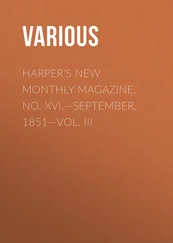Various - Harper's New Monthly Magazine, No. XXIV, May 1852, Vol. IV
Здесь есть возможность читать онлайн «Various - Harper's New Monthly Magazine, No. XXIV, May 1852, Vol. IV» — ознакомительный отрывок электронной книги совершенно бесплатно, а после прочтения отрывка купить полную версию. В некоторых случаях можно слушать аудио, скачать через торрент в формате fb2 и присутствует краткое содержание. Издательство: Иностранный паблик, Жанр: periodic, foreign_edu, на английском языке. Описание произведения, (предисловие) а так же отзывы посетителей доступны на портале библиотеки ЛибКат.
- Название:Harper's New Monthly Magazine, No. XXIV, May 1852, Vol. IV
- Автор:
- Издательство:Иностранный паблик
- Жанр:
- Год:неизвестен
- ISBN:нет данных
- Рейтинг книги:4 / 5. Голосов: 1
-
Избранное:Добавить в избранное
- Отзывы:
-
Ваша оценка:
- 80
- 1
- 2
- 3
- 4
- 5
Harper's New Monthly Magazine, No. XXIV, May 1852, Vol. IV: краткое содержание, описание и аннотация
Предлагаем к чтению аннотацию, описание, краткое содержание или предисловие (зависит от того, что написал сам автор книги «Harper's New Monthly Magazine, No. XXIV, May 1852, Vol. IV»). Если вы не нашли необходимую информацию о книге — напишите в комментариях, мы постараемся отыскать её.
Harper's New Monthly Magazine, No. XXIV, May 1852, Vol. IV — читать онлайн ознакомительный отрывок
Ниже представлен текст книги, разбитый по страницам. Система сохранения места последней прочитанной страницы, позволяет с удобством читать онлайн бесплатно книгу «Harper's New Monthly Magazine, No. XXIV, May 1852, Vol. IV», без необходимости каждый раз заново искать на чём Вы остановились. Поставьте закладку, и сможете в любой момент перейти на страницу, на которой закончили чтение.
Интервал:
Закладка:
In one of the largest and most populous provinces of France, that of La Vendee, many thousand royalists had collected, and were carrying on a most desperate civil war. England, with her ships, was continually sending to them money, ammunition, and arms, and landing among them regiments of emigrant troops formed in London. They had raised an army of sixty thousand men. All the efforts of the Directory to quell the insurrection had been unavailing. The most awful atrocities had disgraced this civil conflict. As soon as Napoleon was firmly seated in his consular chair, he sent an invitation for the chiefs of these royalist forces in La Vendee to visit him in Paris, assuring them of a safe return. They all accepted the invitation. Napoleon met them in his audience-chamber with the utmost kindness and frankness. He assured them that it was his only object to rescue France from the ruin into which it had fallen; to bring peace and happiness to his distracted country. With that laconic logic which he had ever at command, he said, "Are you fighting in self-defense? You have no longer cause to fight. I will not molest you. I will protect you in all your rights. Have you taken arms to revive the reign of the ancient kings? You see the all but unanimous decision of the nation. Is it honorable for so decided a minority to attempt, by force of arms, to dictate laws to the majority?"
Napoleon's arguments were as influential as his battalions. They yielded at once, not merely their swords but their hearts' homage. One alone, George Cadoudal, a sullen, gigantic savage, who preferred banditti marauding above the blessings of peace, refused to yield. Napoleon had a private interview with him. The guard at the door were extremely alarmed lest the semi-barbarian should assassinate the First Consul. Napoleon appealed to his patriotism, his humanity, but all in vain. Cadoudal demanded his passports and left Paris. "Why did I not," he afterward often said, as he looked at his brawny, hairy, Samson-like arms, "strangle that man when I had him in my power?" He went to London, where he engaged in many conspiracies for the assassination of Napoleon, and was finally taken in France, and shot.
Civil war was now at an end, and with most singular unanimity all France was rejoicing in the reign of the First Consul. Napoleon loved not war. He wished to build up, not to tear down. He desired the glory of being the benefactor and not the scourge of his fellow-men. Every conflict in which he had thus far been engaged was strictly a war of self-defense. The expedition to Egypt can not be considered an exception, for that enterprise was undertaken as the only means of repelling the assaults of the most determined and powerful enemy France has ever known. Napoleon was now strong. All France was united in him. With unobstructed power he could wield all her resources, and guide all her armies. Under these circumstances most signally did he show his love of peace, by adopting the very characteristic measure of writing directly to the King of England and to the Emperor of Austria, proposing reconciliation. It was noble in the highest degree for him to do so. Pride would have said, "They commenced the conflict; they shall be the first to ask for peace." To the King of England he wrote,
"Called, Sire, by the wishes of the French nation, to occupy the first magistracy of the Republic, I judge it well, on entering my office, to address myself directly to your Majesty. Must the war, which for the four last years has devastated the world, be eternal? Are there no means of coming to an understanding? How can the two most enlightened nations of Europe, stronger already and more powerful than their safety or their independence requires, sacrifice to ideas of vain-glory the well-being of commerce, internal prosperity, and the repose of families! How is it that they do not feel peace to be the first of necessities as the first of glories? These sentiments can not be strangers to the heart of your Majesty, who governs a free people with the sole aim of rendering it happy.
"Your Majesty will perceive only, in this overture, the sincerity of my desire to contribute efficaciously, for a second time, to the general pacification, by this prompt advance, perfectly confidential and disembarrassed of those forms, which, perhaps necessary to disguise the dependence of weak states, reveal, when adopted by strong states, only the wish of mutual deception. France and England by the misuse of their powers, may yet, for a long period, retard, to the misery of all nations, their exhaustion. But I venture to say that the fate of the civilized world is connected with the termination of a war, which has set the whole world in flames."
To this magnanimous application for peace, the King of England did not judge it proper to return any personal answer. Lord Grenville replied in a letter full of most bitter recriminations. And all France was exasperated by the insulting declaration that if France really desired peace, " The best and most natural pledge of its reality and permanence, would be the restoration of that line of princes which, for so many centuries maintained the French nation in prosperity at home, and consideration and respect abroad. Such an event would at once remove, and will at any time remove all obstacles in the way of negotiation or peace. "
This was, indeed, an irritating response to Napoleon's pacific appeal. He, however, with great dignity and moderation, replied through his minister, M. Talleyrand, in the following terms:
"So far from having provoked the war, France, from the commencement of the revolution, solemnly proclaimed her love of peace, her disinclination for conquests, and her respect for the independence of all governments. And it is not to be doubted, that occupied at that time entirely with her own internal affairs, she would have avoided taking any part in those of Europe, and would have remained faithful to her declarations.
"But from an opposite disposition, as soon as the French revolution had broken out, almost all Europe entered into a league for its destruction. The aggression was real long before it was public. Internal resistance was excited; the enemies of the revolution were favorably received, their extravagant declamations were supported, the French nation was insulted in the person of its agents, and England particularly set this example, by the dismissal of the minister of the Republic. Finally, France was attacked in her independence, her honor, and her safety, long before war was declared.
"It is to these projects of dismemberment, subjection, and dissolution, that France has a right to impute the evils which she has suffered, and those which have afflicted Europe. Assailed on all sides, the Republic could not but equally extend the efforts of her defense. And it is only for the maintenance of her own independence, that she has called into requisition her own strength and the courage of her citizens. If in the midst of the critical circumstances which the revolution and the war have brought on, France has not always shown as much moderation as the nation has shown courage, it must be imputed to the fatal and persevering animosity with which the resources of England have been lavished to accomplish the ruin of France.
"But if the wishes of his Britannic majesty are in unison with those of the French Republic, for the re-establishment of peace, why, instead of attempting apologies for the war, should not attention be directed to the means of terminating it. It can not be doubted that his Britannic Majesty must recognize the right of nations to choose their form of government, since it is from this right that he holds his crown. But the First Consul can not comprehend how, after admitting this fundamental principle, upon which rests the existence of political societies, his Majesty could annex insinuations, which tend to an interference with the internal affairs of the Republic. Such interference is no less injurious to the French nation and its government, than it would be to England and his Majesty, if an invitation were held out, in form of a return to that republican form of government which England adopted about the middle of the last century, or an exhortation to recall to the throne that family whom their birth had placed there, and whom a revolution had compelled to descend from it."
Читать дальшеИнтервал:
Закладка:
Похожие книги на «Harper's New Monthly Magazine, No. XXIV, May 1852, Vol. IV»
Представляем Вашему вниманию похожие книги на «Harper's New Monthly Magazine, No. XXIV, May 1852, Vol. IV» списком для выбора. Мы отобрали схожую по названию и смыслу литературу в надежде предоставить читателям больше вариантов отыскать новые, интересные, ещё непрочитанные произведения.
Обсуждение, отзывы о книге «Harper's New Monthly Magazine, No. XXIV, May 1852, Vol. IV» и просто собственные мнения читателей. Оставьте ваши комментарии, напишите, что Вы думаете о произведении, его смысле или главных героях. Укажите что конкретно понравилось, а что нет, и почему Вы так считаете.












